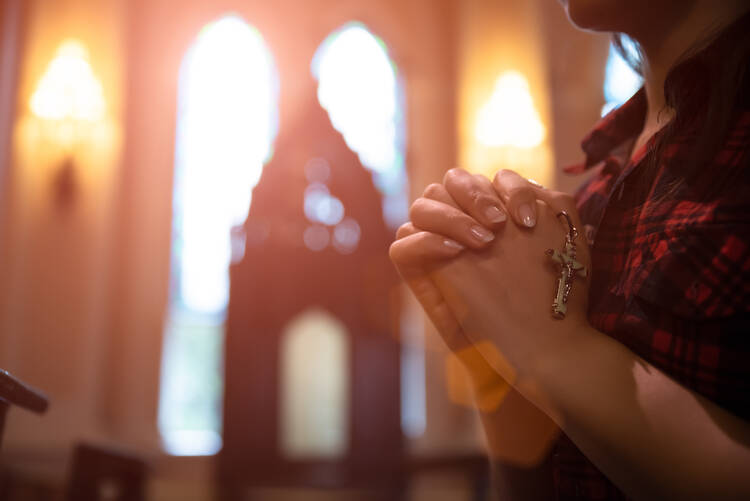In October, news broke that the Rev. Marko Rupnik, a former Jesuit who was credibly and publicly accused of abuse of adult women over a 40-year period, was incardinated into his home diocese in Slovenia. In December, Delaney Coyne, one of America’s O’Hare fellows, reflected on why she stays in a scandal-ridden church as a young woman and feminist and laid out her hopes for reform. “Not only should victims be heard,” she wrote, but “as a church, we should aim to be transformed by their testimonies and the spirit of truth working within us.” Her piece elicited reflective comments from other Catholics grappling with their faith in light of the sex abuse crisis.
I’m glad you stay, Delaney. As a 68-year-old Catholic woman, I find hope in your ability to see the realities of the systemic problems and at the same time hear the voice of God in our church. I too have stayed, even though the church and most clergy have not been honest or Christ-like toward victims of clergy sex abuse. Many survivors feel the indifference and lack of charity from our church. Many feel alone and rejected. That’s been mostly my experience as a survivor of childhood clergy sex abuse. Yet I, like you, feel the Holy Spirit, who is here with us in our Catholic Church in spite of all the problems. I hope you continue to stay. You too are the church, and for that I am grateful.
Kathy Klamka
There have been many horrendous events in history that have come from the Catholic Church. Pope John Paul II offered apologies for over 100 such events. But these apologies recognize only the misbehavior of individuals, the “actions of flawed human beings,” as you wrote. Where did “clericalism” come from? Out of what system did it spawn? What supports its continued existence? As a British journalist covering the sex abuse scandal noted, the Catholic Church does not have the capacity to see its own sins. The church is also a human institution. Look at the secular manner in which it responded to the sex abuse crisis. So why stay? Because I believe that the Catholic Church was founded by Jesus Christ upon the unlimited and unconditional compassion, mercy and forgiveness that he displayed throughout his ministry. If the Catholic Church is saved, it will be from “the smell of the sheep” and not rigid institutional administration.
Jerry Gunville
You have expressed very clearly what I have difficulty putting into words. And may I add that women can make the same cover-up errors as men to protect the church hierarchy. It happened to me, and yet, I am still here, worshiping the Lord in the church I love.
Christauria Welland
God pulls me home every time I want to walk away.
As a 71-year-old Catholic feminist, I’ve struggled with my faith since I was in my late teens. At some point I realized that I will be the thorn in her side, rock in her shoe, the one who keeps challenging the status quo. God pulls me home every time I want to walk away. I have learned that many women, in and out of vowed life, share my hopes and dreams for our church. I will stay and support change instead of leaving!
Christine Sadlowski-Sause
The problem is not clericalism per se. The way to address the abuse crisis is, as pointed out in the article, conversion of heart—not just feelings, but not just habits or doctrine either. Self-donation (sharing so lovingly that you might forget to calculate what you’ve given) will guide us. Fighting clericalism or structure is just circling around the problem, however close you might get to its kernel. That is not the way to end this hellish, sorrowful horror of sexual (or other) abuse. Here goes the recipe for disaster: Think more than you pray (even while praying), devote to apologetics as self-defense not conversation, speak more than you listen. I think all of these things happen too often in the church. We do not need more theology. We need charity. I am shamefully guilty of that “recipe” too. On the other hand, I agree that we need “right relationships,” but we mostly need healing encounters. That’s what Jesus did. I’m hopeful, though. I think we’re slowly moving in that direction.
Maria Moukarzel
My wife, who is still working in the church after more than 43 years, sticks with it in the belief she is making a difference, no matter how small it might be. If she were to leave, who would be around to make the difference she makes? So many people walk away when things don’t go their way. Persistence (I sometimes call it obstinance) is what will make changes. At best, in our lifespan we might change a few grains of sand, but over time, that change will be noticeable.
Stephen Healy








